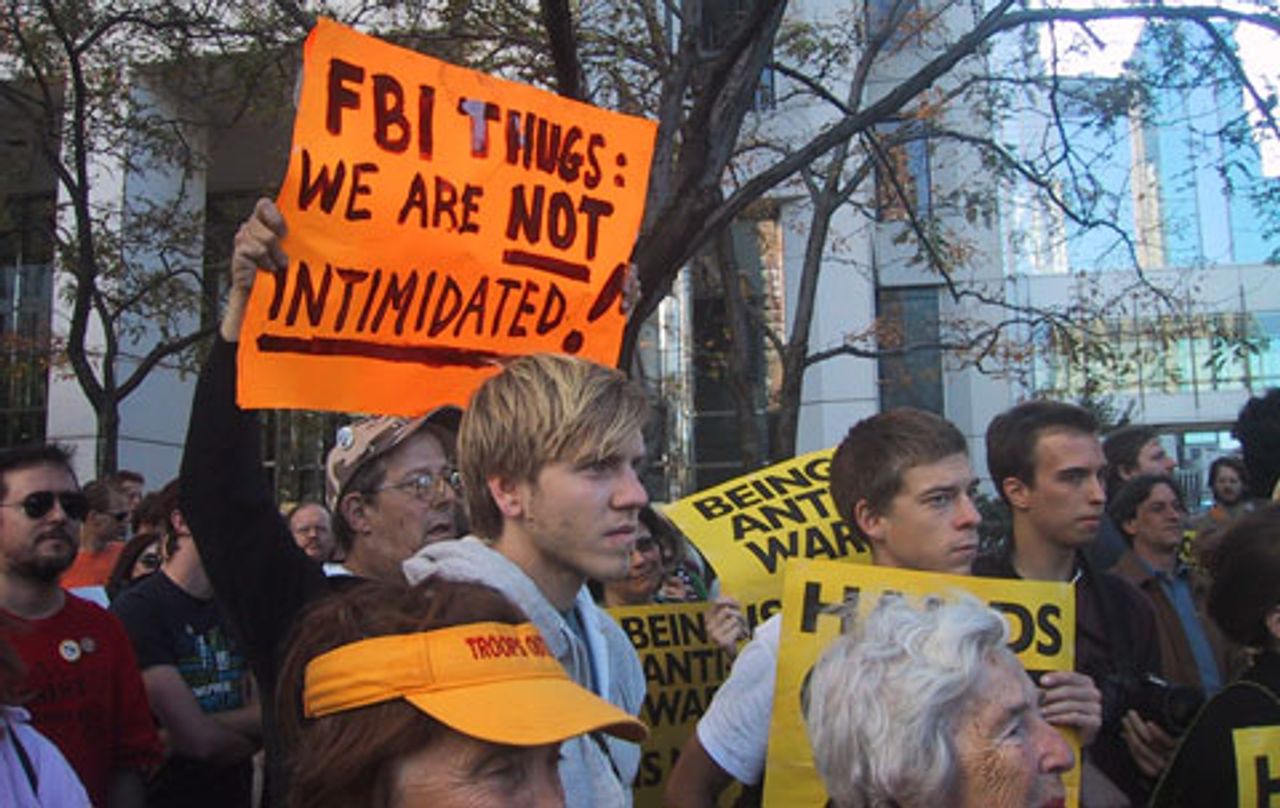On Monday, demonstrations were held in Minneapolis, Minnesota; Chicago, Illinois and other US cities to denounce raids last week by the FBI of the homes of antiwar and pro-Palestinian activists.
 A section of the protest in Minneapolis
A section of the protest in MinneapolisIn actions that bear the hallmarks of a police state, the FBI on Friday targeted members of the Freedom Road Socialist Organization (FRSO) and other groups, seizing papers, computers, cell phones and other material. The raids, which were centered in Minneapolis and Chicago, did not lead to any arrests. However, many of those targeted have been instructed to testify before federal grand juries next month.
According to the Search and Seizure Warrant used in the raid of one individual targeted, Michael Kelly, the agents were given broad authority to take virtually anything they decided might be relevant to investigation of “material support for terrorism.” This included, “Documents, files, books, videos, souvenirs, war relics, notebooks, address books, diaries, journals, maps or other evidence.”
Also subject to seizure were “computer equipment, electronic storage devices, and cellular telephones belonging to Kelly and their contents, including files, telephone numbers, photographs and videos” related to the investigation.
Additional protests are planned Tuesday in New York, Washington DC, Detroit, Los Angeles, and other cities.
Upwards of 200 people attended the rally in downtown Minneapolis outside offices of the FBI to declare their solidarity with Minneapolis antiwar activists who had their homes raided. Speakers from over a dozen different organizations addressed the crowd, denouncing the FBI and Obama administration’s attacks on free speech and democratic rights.
Minneapolis attorney Bruce Nestor reported that he had attended a National Lawyers Guild seminar in New Orleans last week that dealt in part with the Material Support law that is a basis for the current FBI investigation. “We spent an entire afternoon on Thursday talking about this law, only to wake up on Friday seeing it applied in a new and frightening way.”
He warned that the law as interpreted recently by the Supreme Court could “make all of us targets” and emphasized the role played by the administrations of Bill Clinton and Barack Obama in the development of the Material Support law.
“These laws were started in 1996 under a Democratic administration,” Nestor noted. “They’re being enforced now under a Democratic administration. We can talk about the Patriot Act passed in the aftermath of the attacks of 9/11 by a Republican administration. But today it is extended, enforced and carried out by a Democratic administration and a Democratic Congress. This is about a series of laws giving increasing power, not subject to review, to the president and the national security establishment.
“Let’s be objective about what happened on Friday whether you support it or not,” said Nestor. “The internal security forces in the United States, increasingly integrated on a local and national level, carried out a raid using law enforcement internal security agents, using local and national agents, against dissidents who oppose government policy.”
Nestor concluded by pointing out that the new laws could make former US President Jimmy Carter a felon for providing election aid in Lebanon because work there would have to involve Hezbollah, a party with mass support that is designated by the US as a terrorist movement. He added that had the laws been in effect in the 1980s, “the entire anti-apartheid movement would have been found guilty for providing material support to terrorism,” because the African National Congress had been designated by the administration of Ronald Reagan as terrorist.
Peter Erlinder, an attorney and professor at the William Mitchell College of Law, told the crowd that he had been representing Somalis for the last five years who have been harassed by the government. He called them the “canaries in the coal mines” and appealed to the crowd to recognize their cases as part of the attack on democratic rights.
Other speakers included Clyde Bellecourt of the American Indian Movement, who was involved in the confrontation with US government forces at Wounded Knee in 1973. He reviewed the role of FBI harassment during that era.
In Chicago, dozens of antiwar protesters gathered in front of the FBI headquarters on Monday afternoon to oppose the raids on Stephanie Weiner and Joseph Iosbaker. The police presence was heavy—both uniformed and plainclothes—in relation to the number of demonstrators. Speakers addressing the group recalled the long history of FBI repression and harassment of American citizens, including the Palmer raids and the Smith Act. The demonstration broke up after about an hour as numbers of police officers began to quietly close in around the crowd.
